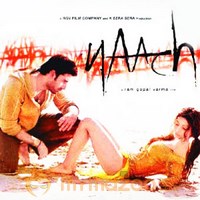
Naach Movie Reviews
| Starring | Abhishek Bachchan, Antra Mali |
|---|---|
| Music | Amar Mohile |
| Director | Kiran Reddy , Ramgopal Varma |
| Producer | Ramgopal Varma |
| Year | 2004 |
| Rating |
Naach Review
by MyMazaa.comAbhi and Rewa, the two protagonists of Ram Gopal Varma's fascinating study of the dynamics of the man-woman relationship within a metropolitan setting, are on their way back after watching an average kitschy movie.
"The same routine stuff, the same things being said over and over again," Rewa the idealist shakes her head in rejection. Abhi is more tolerant. He wants to be part of that "same old stuff" where success apparently is obtained.
"Naach" escapes the blind alleys that Hindi cinema chooses to wander in.
"Naach" is Varma's most personalized and sensitive film ever. In it he creates an untried synthesis of realism within the morally suffocating world of showbiz and a freewheeling fantasy where both the struggling protagonists find success on their own terms.
This isn't the first film where the sham and shallow ambitions of showbiz drives the protagonists apart. Earlier we had Guru Dutt's "Kaagaz Ke Phool", Meraj's "Sitara" and Hrishikesh Mukherjee's "Abhimaan" on the same theme.
"Naach" in fact carries the "Abhimaan" theme forward. On a simplistic level we can take heart in Abhishek doing an overdriven version of his dad's compromised and jealous musician's part in "Abhimaan".
But the dynamics are far more intricate in "Naach". The protagonists are no longer driven apart by their ego. They are victims of a well-oiled machine of power and passion that inflicts a certain self-annihilating rejection of a standard code of morality on their lives.
When we first see Rewa she's sitting at the roadside impervious of passing traffic. As the music in her head plays a pounding invitation (remember Urmila Matondkar's opening song in "Rangeela"?) she jumps to her feet and performs an enigmatic seductive and yet personal dance that has no definition.
Antara Mali's Rewa dances to an indeterminate rhythm that goes well with the film's restless unanchored hitherto-unexplored man-woman axis. The camerawork by newcomer Kiran Reddy is so anguished and passionate you begin to see the characters as dancers caught in a dance of self-destruction.
Varma catches them to stop them from falling to the ground. Abhi's love for Rewa is redeemed, though personally I'm not convinced by the happy ending to their turbulent and short-fused relationship.
If she refuses to be compromised by the murkiness of showbiz, he sees assimilation and surrender as the means to further his career as an actor. If initially she's a choreographer who has never choreographed a dance, he grins and says, "I'm an actor who hasn't acted".
As you share their mutual sneers, you get ensnared into their world of heavy-traffic ambitions. The sounds and fumes of Mumbai's roads qualify the Rewa-Abhi relationship as much as Reddy's poetic cinematography which captures Abhishek and Antara in the most aesthetic kiss I've ever seen on an Indian film.
The relationship grows with an animal passion and then gets stymied as Abhi's ambitions carry him away from Rewa.
It's the first half where their relationship grows that holds you. Small details from the couple's lives and their intense focus on dance crowd the canvas without toppling over the narrative.
The second half about the couple's 'groaning' disenchantment is laden with angry dance numbers where Abhishek's grimace and growl are offset by Riteish Deshmukh's gentle attentions towards Antara. In the film's less weighty moments there's a touch of Varma's "Rangeela".
"Naach" is perhaps what "Rangeela" couldn't be. An anxious and passionate look at the compromises that showbiz demands from the wannabes.
There are only two principal characters and some well-etched passers by providing a beguiling backdrop to the tale. Both Abhishek and Antara perform their parts with a conviction that comes straight from the most unexplored areas of their talent.
Antara's manic energy is so real and so de-glamorised you end up looking at the rhythms of Rewa's soul rather than her steps. Abhishek's USPs, his eyes and smile, have never been put to more positive use.
If "Yuva" marked Abhishek's maturing as an actor, "Naach" marks the coming of age... and rage. The clenched jaws of a reluctantly compromised creative artiste fill the screen with an acoustic angst.
A word for Riteish. He does the most difficult thing for an actor. He listens to the other characters. Quite often you feel Rewa and Abhi are so busy dancing to their own tunes that they could never come forward to cover the stretch that separates them.
Dance, in case you don't know, is a very isolating art form. This is a love story about two dancers who remain alone even in their most shared moments.












